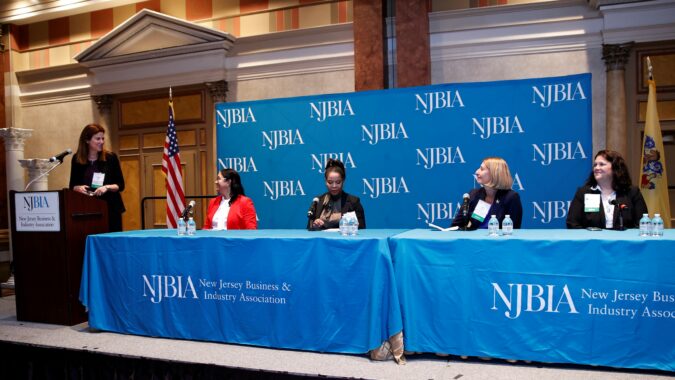For women looking to enter leadership positions in their chosen professions, being yourself is essential. But that doesn’t mean you cannot learn from others, especially those from outside your usual circle of colleagues.
At last week’s NJBIA Women Business Leadership Forum (WBLF), a panel of top women executives in New Jersey shared some of their experiences on how others helped shape their leadership styles while still being themselves.
The panel, entitled “Leadership: Find Your Voice,” was moderated by Karen Reif of PSE&G, with Catherine Frugé Starghill, Esq., of the New Jersey Council of County Colleges; Judy Sailer of Primepoint HRMS & Payroll; Lori Herndon, RN, BSN, MBA, of AtlantiCare; and Monica Slater Stokes of United Airlines.
In developing her leadership style, Starghill, for instance, said she would look for people with whom she shares common ground.
“Whenever I heard someone else speak with whom I related, I would make it my business to get to know them because I thought, ‘Okay, we have something in common here, maybe this person can help me develop my thinking'," said Starghill, Vice President, Strategy and Partnerships. New Jersey Community College Consortium of Workforce and Economic Development.
And it’s not always people who have good ideas, she said. Sometimes she wants to understand how they came up with ideas that just didn’t make sense. Either way, it’s about getting what you need for your professional development.
That advice can apply to anyone, but it’s especially important for women to focus on building those relationships, Herndon added.
“We’re all so busy proving that we are deserving of these roles and that we are capable of doing this work that we miss out on the opportunities ... to learn from others with different perspectives,” she said. “Getting to hear those voices and to better understand what is possible is really important.”
Learning isn’t the only advantage of developing professional relationships. Sailer said that mentors also can be there to support you and help you through those times that people are being critical and coming at us.
“We all have to remind ourselves that 1% of the entire population will not like your ideas, will not like what you say, will not like what you wear,” Sailer said. “And that’s their problem, it’s not ours. We have to remind ourselves of that.”
For Slater-Stokes, the value of learning from others cannot be a substitute for knowing who you are. She recalled an assessment of her leadership style that provided feedback on her positives and negatives. “Of course, I honed in on the negatives,” she said. But doing self-assessments doesn’t mean addressing every negative point but being self-aware enough to know what you’re supposed to learn and what to set aside.
“What remains true is the core of me,” she said. “The fact that I’m passionate, the fact that I don’t mind using my voice, that’s OK. I’m fine with that.”
Exposure to new people and new ideas is especially important for those just entering the workforce. Reif advised her two children, who are entering the workforce right now, to volunteer whenever there is an opportunity because you don’t know what you like until you try it.
“I didn’t think I would be interested in IT and I never thought in a million years that I would be in renewables,” said Reif, who is now vice president of renewables and energy solutions. “But you try it, and you get to learn different things.”
Ultimately, there is no one path to leadership and there is no one way to be a leader. As Starghill put it, “We all are who we are, so leadership is going to look different for each of us.”




